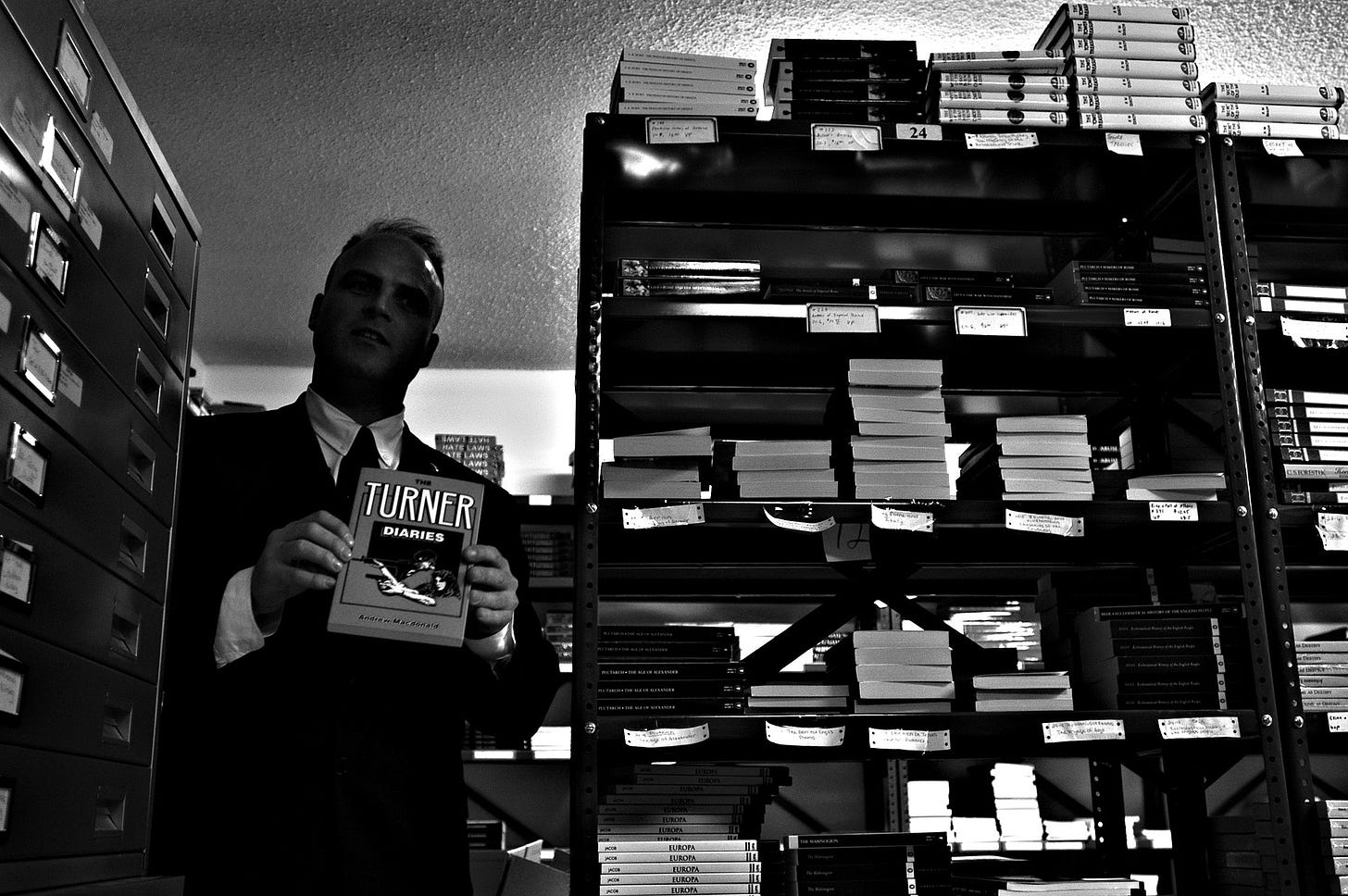Shadow Literature
Fiction featuring ‘replacement theory’ has given the racist ideology new life.

While “replacement theory”—the idea that elites are importing pliant immigrant masses in order to dilute the power of white citizens—is gaining traction among right-wing politicians and commentators, it's been a staple of racist literature for a long time. Racist authors picked it up, fantasized it, and used it as a literary tool to bring the susceptible to adopt a racist ideology.
The concept of replacement theory was first posited in the eighteenth century by the German polymath Johann Blumenbach. For Blumenbach, skin tone was an indicator of how far from direct lineage to Adam and Eve one was. The whiter, the more "pure." Very scientific, right?
A prominent early example of replacement theory in the United States was in a book written as a reaction to Asian immigrants coming to Europe and America in droves. Published in 1878, the anti-Asian novel by Atwell Whitney was titled Almond-Eyed: A Story of the Day. It warns of the rampant sin that will infect the Victorian Christian moralist target audience if the immigration continues.
Not all novelists were in thrall to the idea. An early warning about the dangers of replacement theory came almost a hundred years ago from F. Scott Fitzgerald when he created a villain who would fit right in at today's CPAC: Tom Buchanan from The Great Gatsby. Tom opines about the brilliance of a book called The Rise of Colored Empires by an author named Goddard—an allusion to real-life eugenicist Lothrop Stoddard. Stoddard's ideas would later influence Adolf Hitler and the Nazi regime.
“Civilization’s going to pieces,” broke out Tom violently. “I’ve gotten to be a terrible pessimist about things. Have you read ‘The Rise of the Colored Empires’ by this man Goddard? . . . Well, it’s a fine book, and everybody ought to read it. The idea is if we don’t look out the white race will be—will be utterly submerged. It's all scientific stuff; it’s been proved. . . . This fellow has worked out the whole thing.”
Tom’s racism was just one of several character flaws, of course, but it was clearly portrayed as a flaw. We haven’t always been quite so fortunate.
Replacement theory has helped authors like K.M. Breakey find a growing audience. The Canadian born author, who worries about “the demonization of whites,” wrote Never, Never and Never Again (2018), a family history novel set in apartheid and post-apartheid South Africa that bemoans the replacement of a white minority government with a black majority one. Breakey sees fiction as a means to "disseminate truth and expose lies."
Breakey follows in the footsteps of such writers as Jean Raspail and Renaud Camus.
Raspail, a Frenchman, wrote The Camp of the Saints, a dystopian 1973 novel depicting a French society overrun with "southerners" (Africans) wanting the better life the French had without working for it or respecting French culture. Eventually, the rest of the world is overrun in the same manner, save for Switzerland, where the last remains of the white race write about their tragic downfall.
What makes Raspail's The Camp of the Saints especially concerning is that the book was recommended in leaked emails by then-White House adviser Stephen Miller to writers at Breitbart. Steve Bannon is also a fan of the book, and he gave it new interest when ISIL and the Syrian civil war forced millions of refugees fleeing conflict into the arms of European countries. On more than one occasion Bannon actually called the migration a real-world "Camp of the Saints."
Renaud Camus, also a Frenchman, first burst into the public eye with his novel Tricks, which explored 25 homosexual encounters that cross into the obscene and erotic. That got people's attention back in 1979. To gain attention in 2001, he wrote Le Grand Remplacement (the Great Replacement) warning of a vast conspiracy by "elites" to replace white Christian European populations with non-white populations. His writings are the origin of the catchphrase "you will not replace us" infamously chanted by neo-Nazis at the Charlottesville riots. One could say he's the father of today's replacement theory.
Probably the most well-known work of modern racist literature is The Turner Diaries (1978) by neo-Nazi Luther Pierce: “Think the ’80s action film Red Dawn . . . but with more racism and bloodlust," Vox’s Aja Romano wrote of it. Turner and replacement theory go hand-in-hand. Nearly every manifesto written by monsters like the Christchurch shooter mentions both the Great Replacement and The Turner Diaries. The book was found in the Oklahoma City bomber Timothy McVeigh’s car when he was arrested, British bomber David Copeland mentioned it, the Aryan Republican Army called it inspiration for their bombings and bank robberies, and countless others have referenced the novel as justification for their crimes against humanity.
If neo-Nazis were to pick one book to leave on every hotel nightstand, The Turner Diaries would be it. The reason is simple: The book is insidious in making the reader feel paranoid and isolated about their standing in the world. It says, "They are coming for you," putting real or imagined pre-existing insecurities in the forefront of readers' minds. This is why a consistent connection of these books/ideas to extreme violence is no mere coincidence.
Any public figure espousing Replacement Theory, even those couching their discussion in a winking, "just asking questions" mode, should pause. Do they want to experience the chaos and violence of The Turner Diaries firsthand? On January 6, many people sharing the insurrection on social media said they felt they were living out scenes in the book. Apparently, that alarmed Amazon so much that the company blocked the sale of the book on its website and app after January 6. Other outlets and advertisers should follow suit—because if this type of racialist rhetoric continues, or grows worse, those using their platforms to promote both the books and replacement theory may find themselves in a dystopia of their own making.


